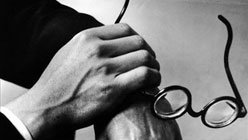I love advice columns! They’re an intriguing glimpse into human nature and they usually give me something to think about. I started reading Miss Manners in high school and these days I follow the columns of Emily Yoffe, E. Jean Carroll, and Carey Tennis.
Do people really write in? Or are you making those questions up?
Yes, people do really write in. All of the questions answered in this column have been sent to the Help Desk from various unknown persons who just need a little help sorting through an art-related issue.
Are submissions truly anonymous and confidential?
Absolutely. Though I can be flip about other things, I take this part seriously. In the beginning we recommended sending questions through a free anonymizer service like Anonymouse.com, but then the editors heard from a friend that a query sent that way didn’t get through. Now I just delete the sender’s original email after I copy and paste the question into a spreadsheet. It’s usually a few weeks between receiving a question and publishing the answer anyway, and by then I’ve forgotten who wrote what.

André Kertész, Broken Bench, NY, 1962.
How do you choose the questions you answer?
I look for questions that are likely to have a broad audience or that reveal an inner working of the machine we call art.
The question about the cheating MFA advisor wasn’t really an art advice question. Why did you answer it?
The power structures that are in play in the art world are fascinating to me. That question hinted at some concerns that rarely get talked about explicitly in the arts: mentoring and moving from a professional relationship into a friendship. Likewise with the big boobs question: if contemplating the use of your sex appeal to get a gallery show isn’t one of “art’s thornier issues” I don’t know what is!
How many questions have you answered so far?
About 50. In the beginning I also answered a few privately, so I’m not sure of the exact count.
Have you ever gotten a question that you won’t answer?
I don’t really want to deal with angry, assumption-filled rants disguised as questions (though I have tackled a few). I’ve also received a few bizarre questions that I simply wasn’t prepared to answer; for those I responded privately to the sender to say that I wasn’t able to take his/her question on.
Where do you get all the ideas that you use in the answers?
I ask people who know far better than I how the art world works. I’ve contacted MFA program directors, professors, gallerists, dealers, independent curators, nonprofits, and my fellow artists. I also look through art-advice books to see what they have to say. One of the most interesting aspects of this job is reaching out to the experts.
Do you follow your own advice?
Not every question applies to my particular situation. I do try to give advice that I would appreciate — and then adopt the advice that I give. To think about it that way is a kind of litmus test — would I do that? — because I don’t want to suggest a course of action that I wouldn’t feel comfortable taking.
Help Desk is a collaboration between KQED and Daily Serving, an international forum for the contemporary visual arts. Please use the comments section below to ask for help and to tell us what you think.




